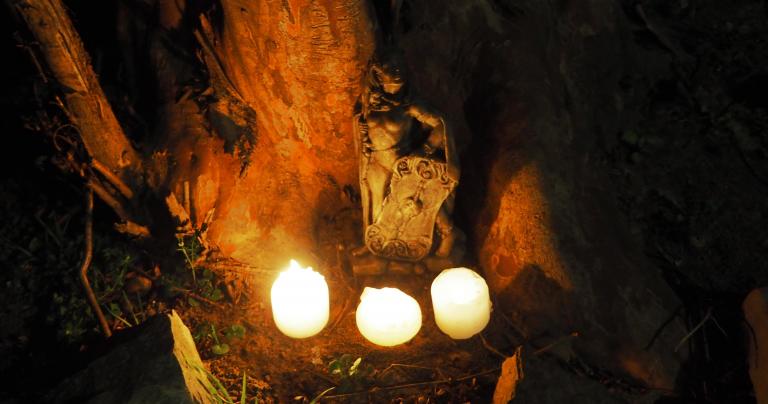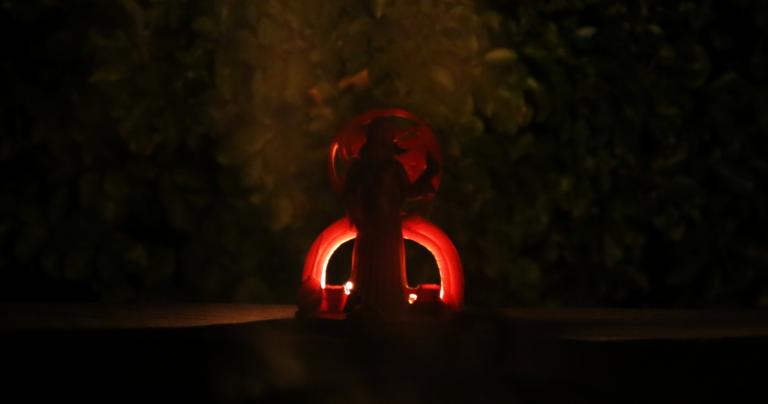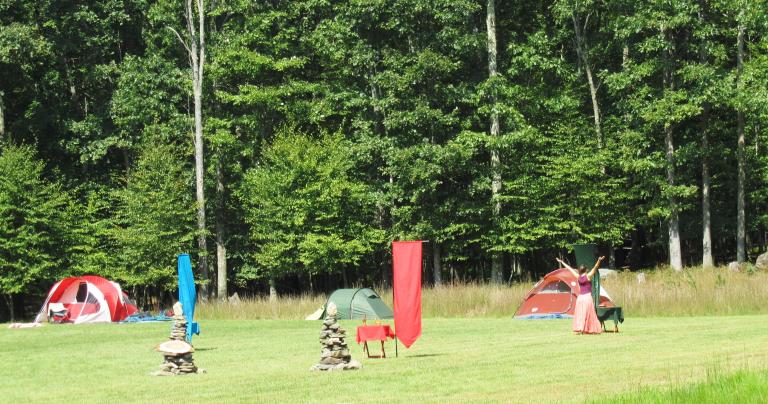My dreams are almost all routine sorting and filing. Sunday night was an exception.
In this dream, I needed a rare book and the only copy was in the library of a fundamentalist seminary. So I e-mailed the library and made an appointment to examine the book (I don’t know what the book was or why it was in a fundamentalist library). When I got there everyone was headed to morning chapel service. Everything closed down during chapel and I couldn’t get in the library, so I followed along to see what their chapel service was like.
Before I could get in, though, someone recognized me. “Hey, you’re a Pagan – what are you doing here?!” And people started closing in on me. It wasn’t going to be a repeat of the death of Hypatia, but it wasn’t going to be pretty.
I stood there as calm as could be, knowing they couldn’t hurt me.
And then I woke up.
There were other details I’m not going to share, though less because they’re too intimate and more because they wouldn’t mean anything to anyone but me. They’re the kind of touchstones that let me know this was more than random brain activity, and that told me this dream wasn’t just for me.
How can you walk into a religiously hostile environment and walk out unscathed?
Sometimes they can hurt you
Saudi Arabia beheads people for apostacy and witchcraft. In other countries, people suspected of witchcraft are beaten and killed. Religious violence in this country is more often directed at Muslims, but protestors sometimes show up at Pagan events and you’re never sure when they might turn violent.
For most of us, though, this is rare. I’ve been a public Pagan for 17 years and I’ve only had a couple of confrontations, none of which got remotely close to physical violence. More common are aggressive proselytizing, verbal assaults, and discrimination in employment and public accommodations. All those can hurt terribly even if they don’t physically injure you.
People who are dependent on religiously intolerant families are in a particularly difficult spot, especially children (of any age) who are financially dependent on parents. So are parents who must deal with separated or blended families for the good of their children.
Words can hurt you and sometimes you can’t just walk away.
But sometimes you need a book badly enough to go to a fundamentalist seminary to get it.
First, build a Pagan identity
In 2015 I wrote Escaping Fundamentalism, based on my own experience in trying to recover from the abusive religion of my childhood. Whether it’s fundamentalist Christianity, aggressive atheism, or any other “my way is the only way” religion or philosophy, the first step in recovery is to get out.
The second step – a series of many steps – is to build a strong Pagan identity. Figure out who you are, who your Gods are, and what your path is. This doesn’t come quickly – it took me many years – but if you don’t get started and work diligently toward it, you’ll never get there.
We Pagans like to say “what you believe doesn’t matter – what matters is what you do.” And so too many of us neglect the philosophical and theological foundations of our religions. What we do ultimately matters more, but we need to understand – at a very basic level – why we do what we do and what it means.
I caught some flak last year for writing A Pagan Creed For Non-Creedal Pagans. Some people are convinced that once we begin writing down what we believe, it’s a short walk to insisting that everyone recite the same creed every week. I think the odds on that happening are small, and I’m certain that working out what you believe and why you believe it is worth the risk.
Before you can debate religion and expect to win, you have to be confident in your Pagan identity. There’s a bit of chicken or egg thing here, because some of that confidence comes from taking on your opponents and holding your own. But it’s best if you’ve done the foundational work up front.
Define the terms of victory
Before you begin any sort of battle – whether physical or metaphorical – define the terms of victory. How will you know when you’ve won? It’s nice to crush your enemies, see them driven before you, and hear the lamentations of the women, but victory is rarely that clear and absolute.
You will not convert your family to Paganism. You won’t get them to stop being fundamentalists. You’re not likely to get them to even admit you might be right. So what can you win?
I feel like I’ve won when I’ve made my case and kept my composure. If I cause my opponent to stumble or to contradict themselves (even if they won’t admit it) that feels even better. But mainly, I won if I spoke the truth as I see it.
Sometimes you’re not arguing for yourself. Sometimes you’re arguing to support others who can’t argue. You take on your racist uncle and your cousins hear that his way isn’t the only way. They may not be able to risk speaking up, but now they know they’re not alone.
Sometimes I speak up because lies and misinformation offend me and I want the truth to be heard. You can criticize Daesh and the Taliban (I’ve certainly done it enough times) without telling lies about Islam.
If you know when you’ve won, you know when you can stop fighting.
A battle avoided is a battle won
You are under no obligation to be all Pagan all the time. If your goal is to get through a family dinner with minimal stress or to land a job you need, maybe this is the time to tuck your pentacle inside your shirt. “Don’t ask, don’t tell” was a lousy way to run the military, but it’s helped me avoid a lot of unpleasant arguments.
You shouldn’t have to do this. Everyone should be free to proudly proclaim their religious identity, as well as any other identity. But “should be” and “is” are rarely in alignment.
Every year at National Coming Out Day my LGBTQ friends post social media reminders not to out anyone who hasn’t outed themselves. Even in this post-Obergefell world, some people aren’t still aren’t safe being openly gay.
The same is true of the “broom closet.” Protect yourself first. Come out if you can. Take on bigots and bullies when you’re ready.
And if you aren’t, live to fight another day.
Religious freedom is for everyone
You may choose to limit your argument to simply demanding respect for your religious freedom. If you’re in a public environment (job, school, etc.) that’s not just an ethical request – it’s a legal right.
Everyone has the right to follow the dictates of their conscience. Thomas Jefferson’s Letter to the Danbury Baptists (the origin of the phrase “wall of separation between church and state”) says “religion is a matter which lies solely between Man & his God.” The Quran says “no compulsion is there in religion” (Surah 2:256).
I have occasionally quoted Martin Luther: “here I stand, I can do no other.” As a polytheist I like to say “many different Gods call many different people to worship Them in many different ways.” I don’t judge people by their beliefs or their spiritual practices – I judge them by how they act, especially how they treat other people. There’s a light year of difference between Evangelicals who believe their way is the only way but who still treat other people with dignity and respect, and the Westboro Baptist Church.
Insisting that people judge you on your actions is always a fair demand.
Play on your own field
Once you’ve decided to engage, make sure you fight on your terms, not on theirs.
Do not argue from the bible. It can be fun to show that you know the bible better than your bible-thumping grandfather, but when you argue from the bible, you reinforce the idea that the bible is a legitimate source of authority. It is not. My standard line is “the bible is a collection of writings by and for a particular group of people living in a particular place and time.”
If you argue with science, make sure you argue with good, solid science. Bad science makes bad religion. And make sure you don’t let the good news of science drag you into the pit of materialism – the idea that there only matter and the product of its interactions. Animism indicates otherwise.
Your spiritual experiences are always valid, and you can always speak with authority about what you experienced. Now, your interpretations may be more accurate or less accurate, so be careful of trying to argue from your own UPG. At the same time, never let anyone tell you what you heard and saw and felt wasn’t real. It was – and other people have these experiences more than they often admit.
Talk about who you are, not who you aren’t
If you’re constantly responding to someone else’s accusations two things are happening. One, you’re building mental associations between you and whatever they accused you of. If you’re constantly explaining how your witchcraft has nothing to do with the devil, all they’ll remember is “witchcraft” and “devil.”
This is why politicians run so many slanderous attack ads – they work. It’s primary season and the Texas Republicans are calling their opponents “liberals.” It doesn’t matter if it’s true. Make it stick and they’ll get some votes.
The second thing that happens when you’re responding to accusations is that you’re playing on their field. If you’re talking about what you’re not, you’re not talking about what you are.
Talk about the Divine in Nature. Talk about the Divine as all genders and not just male. Talk about your ancestors and how honoring them is a sacred obligation. Talk about who you are and what you do.
Not only does this move the game back onto your field, it’s much easier for most of us to talk about ourselves than it is to articulate complex theologies and philosophies. It’s good to understand complex theologies and philosophies, but that’s not the only foundation for our Pagan religions.
Feeling invulnerable takes time
I knew this had to be a dream because there’s no way I could face down a crowd of angry fundamentalists and remain perfectly calm – if only because I hate conflict. But there was a message for me in that dream, because unless they crossed the line into criminal violence, they really can’t hurt me. I know who I am, I know what I am, and I know Who has my back. And I’ve been in enough religious debates I know what to say… though every time I still think of a brilliant comeback an hour after it’s over.
Ten years ago that wasn’t the case. I often responded as a Unitarian Universalist when I really wanted to respond as a Pagan. That was the right thing at the time – I wasn’t ready to take on a fundamentalist as a Pagan.
Until I did. And I did OK.
We worry about difficult family gatherings at Thanksgiving and at Christmas, but they can happen at any time. Take care of yourself – do what you have to do to be safe. Build a good Pagan foundation, so you know who and what you are – and Whose you are. And when you’re ready, play on your field and tell your story.
Now if I can just find that book…


















